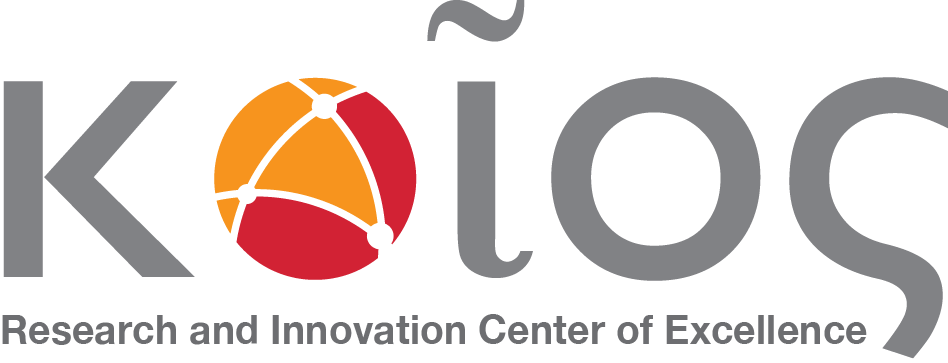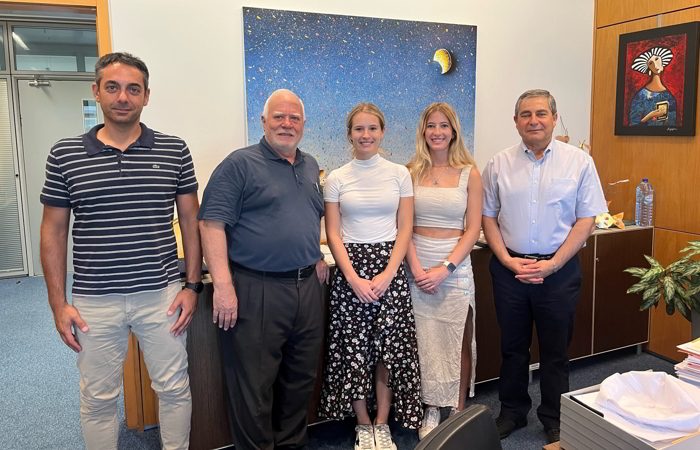International research collaborations are proving essential for tackling some of the most pressing real-world challenges. Recognizing these, researchers from the United States and the KIOS Research and Innovation Center of Excellence at the University of Cyprus (UCY) have come together to leverage machine learning techniques in two critical application areas: healthcare diagnostics and infrastructure inspection.
This internship opportunity was supported by the International Research Experiences for Students (IRES) program, funded by the U.S. National Science Foundation (NSF). This program is designed to foster international research collaborations and expose U.S. students to scientific practices, policies and cultures around the world. By participating in this program, students gain hands-on experience in their fields of study, develop professional networks, and acquire a broader perspective on global scientific challenges and solutions.
This summer, two student researchers that were pre-trained at the Sensor Signal and Information Processing Center (SenSIP), namely, Leslie Miller from Arizona State University (ASU) and Gabrielle Miller from Texas A&M, spent 5 weeks at the KIOS CoE, engaging in cutting-edge collaborative research. Both students worked with KIOS faculty and graduate researchers and with ASU Professor Andreas Spanias, who is the principal investigator of the NSF IRES program.
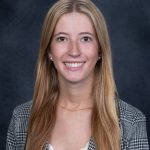 According to Gabrielle, the reason for joining this program was because she was keen on studying abroad and this opportunity perfectly aligned with her interests. She mentions: “The prospect of conducting research in a field I am passionate about while immersing myself in a new culture was incredibly exciting. This program uniquely combines cultural experiences with my academic major, offering a rare and enriching opportunity that few other programs can provide”.
According to Gabrielle, the reason for joining this program was because she was keen on studying abroad and this opportunity perfectly aligned with her interests. She mentions: “The prospect of conducting research in a field I am passionate about while immersing myself in a new culture was incredibly exciting. This program uniquely combines cultural experiences with my academic major, offering a rare and enriching opportunity that few other programs can provide”.
Advancing Healthcare with Machine Learning
The researcher Gabrielle Miller worked on a healthcare project where she had to create a machine-learning algorithm to detect cancerous vs noncancerous tissue in colonoscopy patients. Gabrielle worked closely with KIOS Professor Pitris who is an expert (MD/PhD) in this research area.
According to Gabrielle, this was an incredible project that allowed her to dive into this field, despite the steep learning curve. She said: “With strong support from my mentors, I successfully completed the project and even submitted a paper to a photonics conference in biomedical engineering – an achievement I hadn’t anticipated”.
Streamlining Infrastructure Inspection
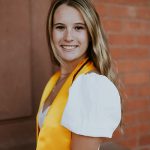 PhD student researcher Leslie Miller worked on automating the classification of various types of infrastructure damage from image data. She worked with machine learning (ML) algorithms and imaging techniques to classify and assess damages in roads or pavements. More specifically, her project involved working with data from the FixCyprus app to help improve road and infrastructure conditions in Cyprus. She worked closely with KIOS Research Lecturer, Dr. Christos Laoudias and with Prof. Andreas Spanias from the ASU SenSIP Center. According to Leslie, the primary experience she gained through this project was applying her machine learning knowledge to a real-life problem. She mentions: “I enjoyed using ML to address a local issue”.
PhD student researcher Leslie Miller worked on automating the classification of various types of infrastructure damage from image data. She worked with machine learning (ML) algorithms and imaging techniques to classify and assess damages in roads or pavements. More specifically, her project involved working with data from the FixCyprus app to help improve road and infrastructure conditions in Cyprus. She worked closely with KIOS Research Lecturer, Dr. Christos Laoudias and with Prof. Andreas Spanias from the ASU SenSIP Center. According to Leslie, the primary experience she gained through this project was applying her machine learning knowledge to a real-life problem. She mentions: “I enjoyed using ML to address a local issue”.
In addition to the work carried out in this project, Leslie delivered a well-attended seminar talk at the KIOS CoE on algorithms, simulations, and results obtained using machine learning, image fusion, and quantum feature extraction for radar and remote sensing applications.
Both students presented their work at the 16th Cyprus Workshop on Signal Processing and Informatics (CWSPI 2024) which was held at the Cyprus University of Technology (CUT) in Limassol Cyprus. CWSPI, was co-sponsored by the local IEEE chapter and featured several faculty, student and industry research presentations. It also provided a great opportunity for both IRES students to network with Cyprus researchers from UCY, CUT and other local centers and labs.
Cultural Exchange and Professional Development
This collaboration extended beyond technical achievements. Living in Cyprus for 5 weeks, the U.S. researchers were able to experience the local culture and traditions, enriching their personal and academic perspectives.
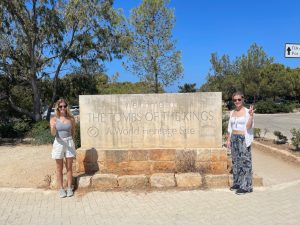 According to Gabrielle, there were so many aspects she enjoyed, each for different reasons. She said: “Building relationships with new people over my time there was incredibly fulfilling. I was mesmerized by Ayia Napa, one of the most beautiful places I’ve ever seen, where I enjoyed multiple swims in unparalleled waters, finding peace and beauty. Exploring Paphos and learning about Cyprus’s rich history was equally captivating. Overall, my stay in Cyprus was a blend of personal connections, natural beauty, and historical exploration”.
According to Gabrielle, there were so many aspects she enjoyed, each for different reasons. She said: “Building relationships with new people over my time there was incredibly fulfilling. I was mesmerized by Ayia Napa, one of the most beautiful places I’ve ever seen, where I enjoyed multiple swims in unparalleled waters, finding peace and beauty. Exploring Paphos and learning about Cyprus’s rich history was equally captivating. Overall, my stay in Cyprus was a blend of personal connections, natural beauty, and historical exploration”.
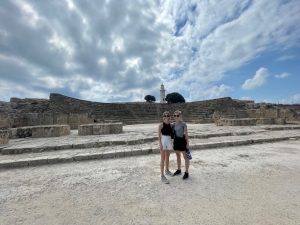 Leslie also mentions: “My favorite part was going to Konnos Beach in Aiya Napa. It was so beautiful, and I really enjoyed it. I also loved touring the historical sites in Paphos and exploring Larnaca. Finally, Leslie noted that she appreciated the quality of life in Cyprus and the opportunity to visit different towns during the weekends and taste all the great Mediterranean food.
Leslie also mentions: “My favorite part was going to Konnos Beach in Aiya Napa. It was so beautiful, and I really enjoyed it. I also loved touring the historical sites in Paphos and exploring Larnaca. Finally, Leslie noted that she appreciated the quality of life in Cyprus and the opportunity to visit different towns during the weekends and taste all the great Mediterranean food.
The U.S. team also met with the UCY Rector, Prof. Tasos Christofides, and discussed the significant impact of international collaboration in solving real-life problems.
The Director of the SenSIP Center, Prof. Spanias mentioned that this research collaboration between the University of Cyprus and the Arizona State University has been running successfully for 6 years and even during COVID-19 in 2020 and 2021 it operated virtually. Students from the IRES program collaborated with the KIOS center and co-authored IEEE papers and research reports with their KIOS and SenSIP mentors. Prof. Spanias expressed his deep appreciation to the KIOS faculty, postdocs and graduate student collaborators, as well as to the KIOS and ASU personnel, that helped make this program successful.
The IRES program is funded by NSF award 1854273.
